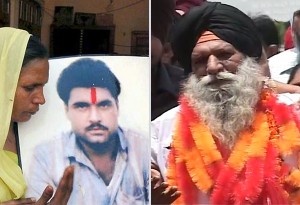
Amritsar, June 29: Freed after a high decibel drama following Pakistan’s alleged flip-flop of first announcing the release of Indian prisoner Sarabjit Singh and later clarifying that it was Surjeet Singh who was to be repatriated, Surjeet Singh — who on Thursday crossed over to India from Pakistan after spending more than 30 years in prison — claimed that Sarabjit had “converted to Islam” and was now known as “Sarfaraz” in Lahore’s Kot Lakhpat Jail.
Surjeet also claimed that another Indian prisoner on death row in Pakistan, Kirpal Singh, had also “converted to Islam” and had a new name “Mohammed Din”.
Speaking to mediapersons at the information centre of the Shiromani Gurdwara Parbandhak Committee after paying obeisance at Golden Temple, Surjeet said: “Sarabjit Singh and Kirpal Singh have converted to Islam. They probably did so in hope of getting mercy. But no mercy was granted to them. Pakistan authorities do not grant mercy to even their own nationals.”
When contacted, Sarabjit’s sister Dalbir Kaur denied that Sarabjit had converted to Islam. “This is not true at all. Sarabjit was a Gursikh, is a Gursikh and will remain a Gursikh. He has kept photos of Sikh gurus in jail and a Sikh religious book. He regularly recites from that book,” she said.
Dalbir added that during her visit to Pakistani jail to meet Sarabjit, she did heard people calling Kirpal Singh by a Muslim name. “But this is not the case with Sarabjit. Had he converted, he would have some Muslim name,” she said. “When I went to meet him in Pakistan, he was either addressed as Sarabjit or Manjit.”
When informed that Surjeet had claimed that Sarabjit had changed his name to “Sarfaraz” after “converting to Islam”, Dalbir insisted: “No way, Sarabjit remains Sarabjit and a Sikh and has not changed his name or converted to Islam.”
Dalbir also took exception to Surjeet’s statement that Sarabjit was hale and hearty in jail. “How can a person lodged in solitary confinement be happy? If this was the case, why will prisoners seek release?” she asked.
Meanwhile, Surjeet claimed that if things fell in place, he would ensure that Sarabjit was back home in three months. “Seven to eight MLAs of Pakistan are my very good friends. Even Pakistani President Asif Ali Zardari is my good friend. I have had breakfast with Zardari. And I will ensure Sarabjit’s release,” Surjeet said, alleging that the Pakistani media and the ISI were against Sarabjit’s release.
“It has to be done at the presidential level. If ISI comes to know about any effort for Sarabjit’s release, the agency will never allow it to happen,” he added. Saying that his and Sarabjit’s cases were entirely different, Surjeet added: “The case of Sarabjit, who faces charges of terrorism, is entirely different from mine. Neither India nor Pakistan would like to release terrorists.”





Comments
Add new comment